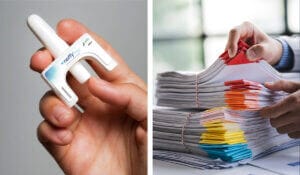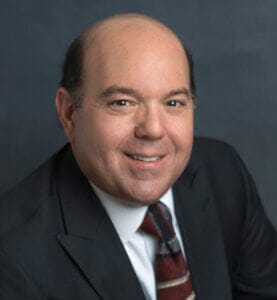
The makers of the epinephrine nasal spray called neffy are pushing forward in the effort to win approval from the Food and Drug Administration.
Allergic Living checked in with Richard Lowenthal, CEO and president of ARS Pharma, to find out where things stand. In September 2023, the FDA had declined to approve the nasal spray for treating severe allergic reactions, instead calling for an additional study. This came as a shock to the company and many in the food allergy community.
Though disappointed, ARS Pharma’s team immediately got to work to figure out their next steps. They are now pursuing two paths, Lowenthal says.
The first: disputing the FDA’s denial in the hopes of having it reversed. They’re expecting a decision on that by February 3.
The second: conducting the additional research in patients with nasal congestion that the FDA asked for. ARS Pharma plans to submit the new trial results to the FDA in March or April.
In May 2023, an FDA advisory committee made up of allergists and other experts had recommended that the agency approve the 2-milligram epinephrine spray without further study. It was to be the first alternative to epinephrine auto-injectors.
ARS Pharma Disputes FDA Decision
In voting to approve, advisory committee members noted that a needle-free alternative would cut down on patients’ known hesitancy to use epinephrine auto-injectors.
The FDA typically follows the recommendations of its advisory committees, but didn’t with neffy. Lowenthal later told Allergic Living he had also received other indications from FDA officials that approval was coming soon.
But the FDA said it wanted to see a study specifically on pharmacokinetic or exposure levels to two doses of the neffy spray in patients with seasonal rhinitis (not anaphylaxis). For the trial subjects to have congestion, Lowenthal says the idea was that purified antigen (or allergen) would be sprayed into their noses.
The ARS Pharma team was perplexed. It had agreed with FDA officials, even before the advisory panel review, that it would conduct such a study in nasal congestion. But this was to be an additional study after approval.
Why now were they being told they had to do it ahead of approval?
Seeking answers – and another review of its application – ARS Pharma filed for formal dispute resolution in November 2023. The job of reviewing the FDA’s decision on neffy was given to Dr. Nikolay Nikolov, the FDA’s division director of Rheumatology and Transplant Medicine. Nikolov was not involved with the earlier review.
Lowenthal and allergists working with ARS Pharma met with FDA officials again in January 2024. “We asked, ‘What are you really looking for here? What is the scientific concern and what is the outcome you’re expecting?’ We can’t get that answer from the agency right now,” Lowenthal says.
Nikolov can decide to overrule the FDA’s earlier decision and approve neffy, or let it stand, Lowenthal explains. His response is expected by Feb. 3.
ARS Pharma’s Repeat-Dose Study
While awaiting that decision, ARS Pharma is moving ahead with the second part of its strategy: the repeat-dose study in people with allergy-induced nasal congestion.
It set up a trial with 42 participants. First, they were given two doses of nasal epinephrine when they had clear noses. Then, they got two doses of the nasal spray when they had nasal congestion due to an antigen being sprayed up their noses. That challenge brings on intense congestion and has a greater impact on the nasal lining than ordinary stuffiness due to seasonal allergies, Lowenthal says.
In the stuffy nose state, participants dosed neffy twice in one nostril, and another time in alternate nostrils, to see if that made any difference in absorption. Those results will be compared to two doses of epinephrine given by syringe.
“From what we know so far, we have no concerns with the data,” Lowenthal says.
In fact, the first dose of nasal epinephrine is likely to clear up the rhinitis symptoms, because of the effect of the epinephrine on the nasal passages. Giving the second dose “may be more like normal conditions dosing,” Lowenthal says.
When the researchers submit the results to the FDA in late March or early April, the agency then has up to six months to review the submission. Then it will render its decision.
What Will Congestion Study Reveal?
ARS Pharma has already conducted studies on the nasal spray in people with nasal congestion. But both looked at a single epinephrine dose.
One small trial was in people who had nasal congestion due to an upper respiratory infection, such as cold, flu or a sinus infection. It found nasal congestion did not make any meaningful difference in patients’ ability to absorb the spray into the bloodstream.
In another clinical trial, participants had an antigen (or allergen) sprayed up their noses to provoke nasal congestion. That trial found epinephrine was absorbed faster in people with nasal congestion than epinephrine given through a syringe. However, the levels of the medicine in the blood dropped off faster in people with nasal congestion.
The two-dose congestion study results will be “scientifically interesting,” Lowenthal allows. It could reveal whether it’s best to do two sprays in the same nostril, or in alternate nostrils.
“But it’s not material to keep [neffy] away from patients and caregivers any longer.”
Keeping Neffy on the Front Burner

In the FDA’s big bureaucracy, drug applications are numerous, and delays are common. Lowenthal wants to keep neffy top of mind among FDA officials, he says.
Surveys have found that many people fail to use epinephrine auto-injectors, even when symptoms clearly call for it.
The food allergy community has strongly supported ARS’s efforts for an approved needle-free epinephrine device. After the FDA decision to deny approval, Lowenthal says FDA Commissioner Dr. Robert Califf received 10,000 emails.
So many people with food and other severe allergies are “unwilling to inject,” he says, making it urgent to get an epinephrine nasal spray without further delay.
Second Spray Makes Progress
Bryn Pharma, which is developing the Utuly brand nasal epinephrine spray, is also making progress. In November 2023, the company released results from an open-label trial in adults with and without nasal congestion.
Adult participants got two doses of a 6.6 mg nasal epinephrine spray, called NDS1C in studies. Patients had the doses in either in the same nostril or in alternate nostrils for a total dosage of 13.2 mg. Researchers compared the results to a single injection of epinephrine using an auto-injector or manual syringe.
The study found that blood levels of epinephrine were higher and stayed elevated longer with the nasal spray than with the auto-injector. Nasal congestion didn’t affect absorption of the nasal spray. NDS1C “offers patients at risk of anaphylaxis a potentially safe and effective alternative to needle-based administration,” said Sandy Loreaux, chief executive officer at Bryn Pharma.
Related Reading:
Setback for Neffy Epinephrine Spray as FDA Calls for More Study
May 2023: Expert Panel Recommends Neffy Spray’s Approval





